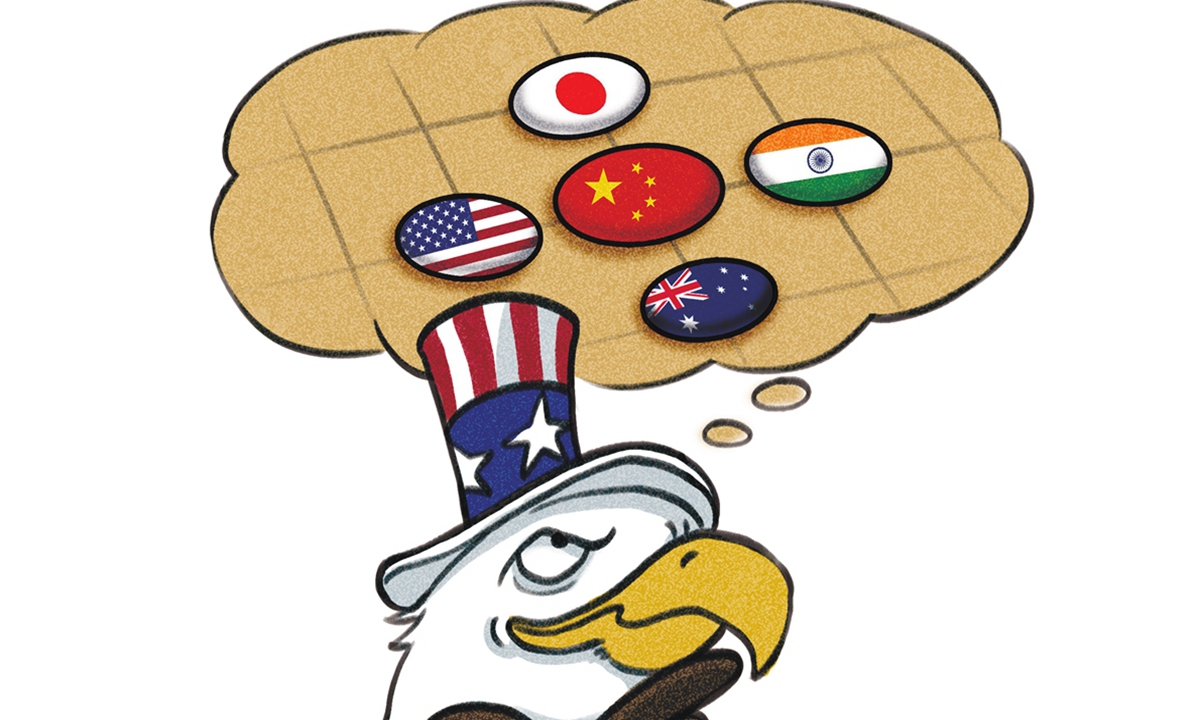
Illustration: Liu Rui/GT
The Malabar naval exercise, participated by the US, India, Japan and Australia, kicked off on Thursday off the coast of Guam in Western Pacific. None of the four countries officially said who the target is, but it is clear their imaginary enemy is China. This is the first joint maritime exercise within the framework of Quad in the Western Pacific and apparently aims to overawe China.
The US has instigated a strong atmosphere of the Cold War and the camp confrontation. It has oversimplified the current geopolitical competition. Every time Washington showcases its allied forces against China, it looks grand but is in fact grandiose, often off the point. They have shown the stubborn incompetence of the current US' elites as well as the US' institutional weakness as the country can only resort to the outdated and unsophisticated method when faced with modern complexities.
The scenario and nature of the international competition in the 21st century has undergone great changes compared with that in the last century. Competition has become highly complicated. Competition between China and the US used to take place on economy and technology. The US feels uneasy and worried about its hegemony as China develops so rapidly that its economy could even surpass that of the US. China and India have border frictions, but India is clear that China has no intention to bring India to its knees. Japan is reluctant to admit China's development and cannot adapt to the changes in comparison of the strength between the two countries. Australia had no frictions with China at all, but it lacks the sense of security due to its unique geographical location in South Pacific, and thus plays the role of a running dog of the US in exchange for protection.
China has no will to get involved in a strategic rivalry with the four countries - why should China do it? Most probably the four countries have no bravery to head into a showdown with China, nor are they prepared to do so. They conduct joint military exercises not because they believe there will be an imminent marine conflict with China, but because they want to show off their "unity" and comfort themselves by displaying their strength to China.
The old-fashioned bluff and bluster is like a show that doesn't sell. They have to get an audience with complimentary tickets. The Chinese people won't buy that. Their collusion cannot jeopardize the dynamic mechanism that drive China's development, nor can it contain China in reality. In short, these countries cannot form a united force to block China's continuous growth and development.
China is adapting to the US' showing off of such collusion. That the Indian Navy rushed to join the exercises with different countries is particularly ridiculous. China will only focus on doing its own things well, including accelerating its economic development, building its warships one after another, comprehensively upgrading its military strength and combat capability, as well as being ready to make anyone that intrudes China's core interests pay.
On Wednesday, Admiral John Aquilino, commander of US Indo-Pacific Command, noted during his visit to India that China's military buildup is the largest by a country since World War II, "both conventional and nuclear." He then played dumb by stating that he could not explain what China's intent is. Well, since he doesn't understand China's intent, let's tell him how Chinese society comprehends this issue:
China needs to ensure that its modernization process will not be overwhelmed by US military blackmail, and its push for the country's reunification will not be blocked by US military intervention. In other words, we need to use our growing military power to force the US to abandon the idea of using military means to launch a secondary attack since its economic and technological competitiveness are gradually declining, and make sure that China and the US contest in a peaceful way.
Each and every country has its right to strengthen its normal relations with the US. This is their own business. However, any county which becomes a US accomplice in containing China must watch out, as well as those countries hoping to elevate their position in solving disputes with China by taking advantage of the US exploitation. China will make any country which steps on China's bottom line on security issues suffer without mercy, no matter if it is a frequent participant of joint military exercises with the US or a US ally.
When Japan tried provocatively to nationalize the Diaoyu Islands in 2012, China made a clear response by enhancing and normalizing patrols around the islands. Last year, after the Chinese and Indian troops clashed in the Galwan Valley, China taught India a bitter lesson. If Japan, Australia, and India dare to "go big," China will definitely give them an even bigger lesson.
China stands firmly on its own position in terms of safeguarding national interests, and will bury all kinds of ambitions and illusions against China as well as alliances and cooperation mechanisms that support these ideas. We welcome open and frank competition, but we will also strongly deter attempts to contain China or force China to give in. The US, Japan, India, and Australia have come together in a way that shows their lack of confidence. They can do nothing to China, a country with sufficient momentum for development and determination to defend its interests.




